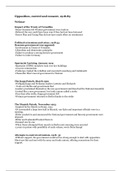Opposition, control and consent, 1918-89
Weimar
Impact of the Treaty of Versailles
-Many Germans felt Weimar government were traitors
-Believed the war could have been won if they had not been betrayed
-Dawes Plan and Young Plan did not have much effect on resentment
Political extremism and crises, 1918-33
Reasons government was opposed:
-Involvement in Treaty of Versailles
-Liberalism and democratic principles
-Failure to produce a strong decisive government
-Failure to unite Germany
Spartacist Uprising, January 1919
-Spartacist (USPD) members took over key buildings
-100,000 communists
-Freikorps crushed the rebellion and executed Luxenburg and Liebknecht
-Chancellor Ebert moved government to Weimar
The Kapp Putsch, March 1920
-Wolfgang Kapp and Freikorps leaders Luttwitz and Ehrhardt
- Took over Berlin and government fled
-Leaders proclaimed themselves the new government and dissolved the National Assembly
-Looked like a new government, but trade unions called a strike
-Four days after strike, Kapp government fell
-Weimar government returned to Berlin thanks to the strike
The Munich Putsch, November 1923
-Inspired by the March on Rome, 1922
-SA surrounded a large beer hall in Munich, van Kahr and important officials were in a
meeting.
-Hitler crashed in and announced the National government and Bavaria government were
deposed.
-Hitler and Ludendorff locked them in
-Escaped one by one
-When Nazis attempted their march on Berlin next morning were arrested
-5 years in prison with possibility of early release, wrote Mein Kampf
Attempts to control extremism, 1918- 32
-Without support, the government would not be strong enough to deal with opposition.
Ebert saw this and met with the army and trade unions, offering concessions for their
support.





